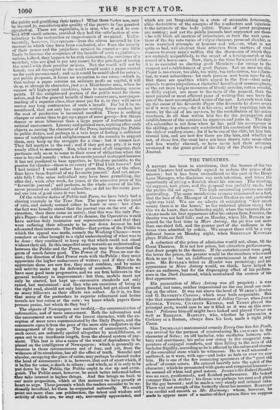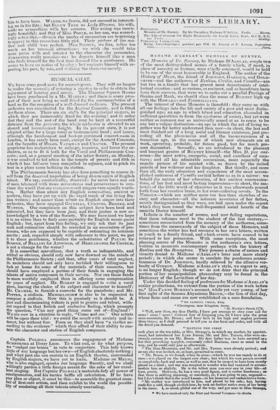THE THEATRES.
A REPORT has been in circulation, that the lessees of the two Great Theatres had mutually agreed to reduce the prices of ad- mission ; but it has been contradicted on the part of the Drury Lane Manager, who disclaims any such intention, and takes the opportunity of giving a flourish about his success. The meeting, we suppose, took place, and the proposal was probably made, but the parties did not agree. The nigh contracting powers are only protocolling. The same mendacious rumour announced as a fact, that the loss of the Manager of Covent Garden on one particular night was 1401. We , are no adepts at estimating " how much money there is in the house," as the technical phrase runs ; but this we do know, that on Saturday night, when the veteran BLAN- CHARD made his first appearance after his return from America, the theatre was not half full; and on Monday, when Mr. BUTLER ap- peared for the first time in Marc Antony, the pit was not more than one-third full, and the greater part of the audience in the boxes were admitted by orders. We suspect there will be a very dillbrent house on Monday night, when SHERIDAN KNOWLES plays William Tell. "
A reduction of the prices of admission would not, alone, fill the Great Theatres. It is not low prices, but attractive performances, that draw people to the theatre. If the entertainment were good,. the lower the prices, the greater would be the numbers who would flock to see it : but an indifferent entertainment is dear at any price. Mr. BUTLER'S debut as Hamlet was promising; .and his appearance in Marc Antony would, we think, have helped to draw an audience, but for the disparaging effect of his perform- ance in the Dark Diamond, which neutralized the success of his first appearance.
His personation of Marc Antony was all propriety : it was graceful, but tame, neither impassioned on the one hand nor rant- ing on the other. It was not above the level of WARDE'S Brutus and G. BEensaris Cassius; which were both respectable. But who that remembers the performance of JuliUs Cevsar, when JOHN KmiBLE, YOUNG, CHARLES Kaana, and TERRY played the principal parts, would care to see it filled as it was on this occa- sion ? Polonius himself might have looked and played Casar as well as EGERTON. BARTLEY, who, whether he personates a Cockney or a Roman, always does his best, made a right jolly Casca.
Mrs. INCHBALD'S matrimonial comedy Every One has his Fault, was revived for the purpose of reintroducing BLANCHARD in the character of So/us; an old bachelor, who oscillates between celi- bacy and matrimony, his pulse now rising to the congenial tem- perature of conjugal comforts, and then falling to the zero of old bachelor frigidity, according as he is affected by the calms and storms of the connubial state which he witnesses. He is well seasoned— mellowed, as it were, with age—and looks as hale as ever we saw him. He is one of the few remaining specimens of the "good old school" of comic actors. He entered heartily into the spirit of the character; which he personated with gusto and congenial humour— he seemed all whim and good nature. JONES'S SirRobertRamble was an easy, gentlemanly, and finished performance. He looked younger than in Archer; his dress was perhaps too neat and plain for the gay baronet ; and he made a very steady and rational rake. There was not enough of the butterfly about his manner. BARTLEY was cordial and smooth as Mr. Harmony; whom, however, he made to appear more of a matter-of-fact person than we suppose him to have been. WARDF.. tts Irwin, did not succeed in interest- ing us in his fate ; • but Ett..EN TREE as Ludy Eleanor, his wife, made us sympathize With her sorrows. Her acting was touch- ingly beautiful; and tilMt of Miss POOLE, as her son, was exceed-. ingly artist-like,tIveugh the marks of mannerism are beginning to appear in this precocious little girl. Their picture of the mo- ther and •ehihl was perfect. Miss SIDNEY, we fear, relies too much on her personal attractions: we wish she would take more pains loth and interest in the character she personates. Foartestna really provokes us: he deports himself like a man who finds limself for the first time dressed like a gentleman. He seems to have no notion of by-play ; but contents himself with re- peating his part, by rote, and walking the character merely.



























 Previous page
Previous page